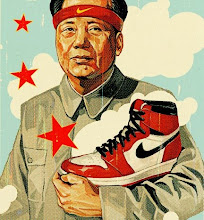Saturday, April 11, 2009
China's Electrical Cars
Monday, February 09, 2009
Chinese Savings = Religion
For the past few weeks, I've been spending more time with my grandparents. They came to visit our extended family for Chinese New Year and are enjoying the warm weather and nice accommodations here in Shenzhen. I try to see them at least 3-4x a week and I usually take them out to eat western food - something they enjoy but don't frequently do.
Even though each of my grandparents still receive more than 3000 per month in retirement from the government as well as consistent money from my mom and uncles, they always stash it away. (My grandparents also have all of their medical bills taken care of by the gov't.) I have been trying for some time now to convince them to spend more money to enjoy their golden years. What’s wrong with more traveling, taking taxis and eating well? They won’t do it, but are always saving. Although they like eating McDonald's and Pizza Hut, they don't like to pay for it.
While the western media argues that due to the lack of a social safety net and social security system, Chinese people absolutely need to save - because the gov't won’t take care of them. I disagree with this notion.
Saving money is a religion in China, especially for older generations. While some people have plenty of money saved away already, they still do it. Their daily lives have been routine for so long that there’s hardly any time or anywhere to spend the money. Buying groceries in the morning, cooking at home and playing cards and mahjong can only cost so much.
Migrant workers are another example of savers. They typically make about 2000RMB or less every month and save the majority of it - sending some home. However, if you look at them, they all wear some decent clothes, laptops and all have better cell phones than I do. They just typically save on everyday expenses and sometimes make that big purchase, buying something more than one month's salary.
I've recently thought that with improving living standards - esp. in the cities, Chinese middle class and white collar young people will evolve to a western-style lifestyle of using credit and spending lavishly without regard for price and cost.
Some of my friends are like this. They spend most of their relatively high salary 10,000 RMB/month on iphones, designer clothing and taxis. They travel all over China and SE Asia. They're living the good life. I worry that if these people are the next generation, China will save less.
One recent CNN report made me feel optimistic about these Chinese middle class. It is reported that there is an online group who tries to spend 100RMB/week. That's incredible! These people want to be more consceince of day-to-day spending and to be more mature of managing their own finances. Maybe there is hope yet for China and its future...
Check out the report:
Thursday, February 05, 2009
China's (Optimistic) Future
Wednesday, February 04, 2009
Shenzhen Mass Transit: For the People
The metro runs as a regular company, but with the Shenzhen government as the controling party, we set the ticket prices. Our goal is to provide affordable transportation for Shenzhen citizens. We make sure that the bus system and the metro system are not profit driven so that we can give the citizens a great service at a reduced price. This is also why all people over the age of 65 ride free of charge as well.As the expanded network comes online, we believe that even more people will ride the metro based on its convenience. Shenzhen will be a much different city. We believe the 500 million loss we incur every year will be reduced but in reality, that isnt too important. Cheap, reliable service to the people are.
Tuesday, February 03, 2009
Chinese 海归 (Turtles) Returning Home
Friday, January 30, 2009
Cheerleading in China. Yay!
 One of the newest developments in the realm of Chinese sport has been the interest in cheerleading and cheers competitions. Since before the 2008 Beijing Olympics, there has been a drastic increase in mainstream fascination, participation and expansion of the "sport". Although this seems like less of a blog-worthy development, it is still an interesting aspect of Chinese culture that is changing.
One of the newest developments in the realm of Chinese sport has been the interest in cheerleading and cheers competitions. Since before the 2008 Beijing Olympics, there has been a drastic increase in mainstream fascination, participation and expansion of the "sport". Although this seems like less of a blog-worthy development, it is still an interesting aspect of Chinese culture that is changing.When I first arrived in China, there were very few, if any cheerleaders of any kind. Although there were forms of dance in traditional Chinese culture, there was definitely a lack of a performance art that combined athletic maneuvers, performance and peppiness. One can even make the argument that traditional Chinese culture frowned on this type of performance for it wardrobe and style.
Earliest forms of cheerleading in China were glorified jumping around of cute girls in relatively skimpy outfits during timeouts at Chinese Basketball Association (CBA - the Chinese national basketball league) games. These performances were often elementary and actually quite embarrassing to watch.
However, as the Backstreet Boys and Britney Spears influence on pop dancing (as well as Korean and Japanese pop) changed somewhat Chinese pop singers, this influence has also translated into the increased recognition and better accented moves in cheer circles. In the past months, there has been a noticeable improvement in everything cheerleading related.
During the preparations for the 2008 Beijing Olympics, cheerleading professionals from the US were invited to come to China to help mentor, train and develop girls who were going to perform at the games. In total, China trained 200,000 people to cheer in preparation for the Olympics. This national initiative really helped improve Chinese aspiring cheerleaders.
Without knowing how many Chinese schools have cheer programs, it is notable that many TV programs include cheer performances and competitions of many Chinese schools. There has been definitely an increase in peppiness.
While these programs are becoming more frequent, coverage of international competitions have also been broadcasted. As I am writing this post, I am watching the 2008 World Aerobics competitions on the main Chinese sports channel (CCTV5). Other events, including the US cheer championships usually held in Disneyworld, have also been given prime exposure to Chinese audiences.
Although this type of performance dance/sport is still in its infancy in China, it has been marked by notable investment and development (just as in every other industry in China).
Wednesday, January 28, 2009
Counterfitting the RMB
When talking to my Chinese uncle and his friends a couple of days ago, they hypothesised that the fake bills orginiated from Taiwan. They described it as a relentless competition between the mainland and taiwan. The goal is to access the others' financies and undermine the currency. They suggested that China has also done the same in Taiwan.
No matter what the origions are, it is still very intimidating to know that fake bills are so prevelent among the population. Friends in the banking industry who handle and count money everyday have also discussed the current situation and the different countermeasures the banks are trying to implement. However, when people depsoit the fake currency in the ATM, it is automatically recycled when others retreve money.
Here's a recent CNN report on the situation:
